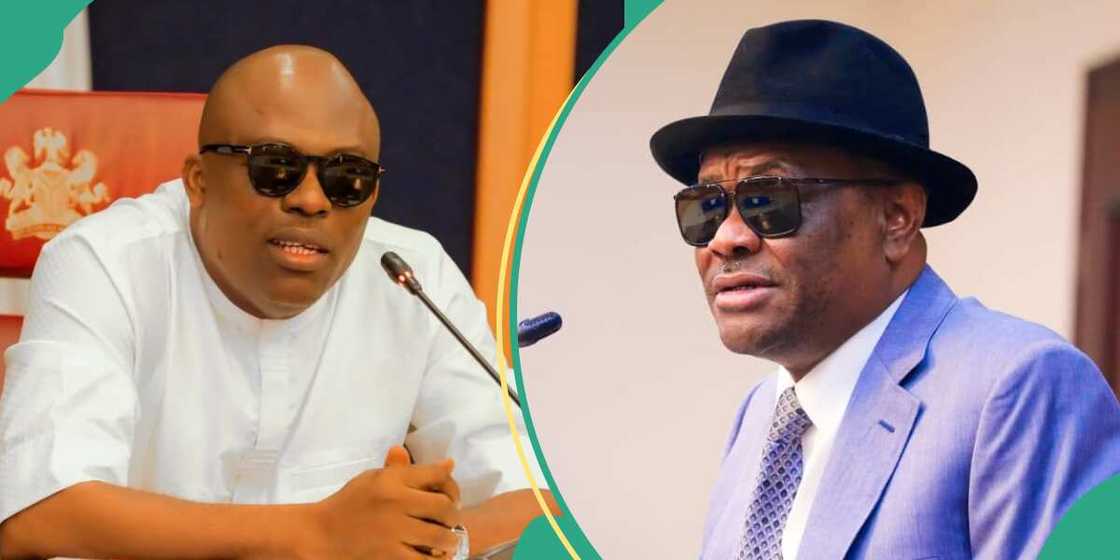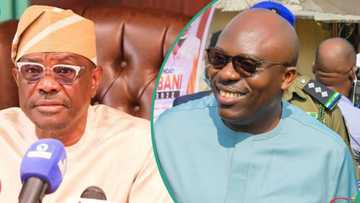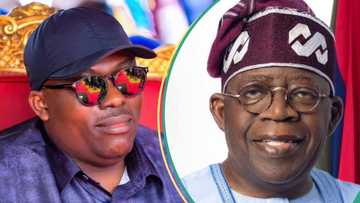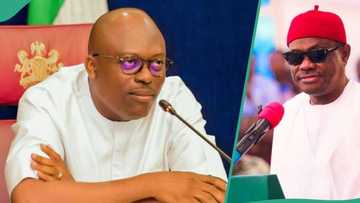Rivers Crisis: 3 Reasons Why Wike May Lose Rivers Structure to Fubara
- There is no official declaration that the feud between Governor Sim Fubara and his predecessor, Nyesom Wike, has ended.
- Wike and Fubara have been at loggerheads over the political structure of Rivers State and the control of power.
- However, Fubara might likely be at the advantage radar as Legit.ng outlined some factors that might have collapsed Wike's political career in Rivers.
Legit.ng journalist Segun Adeyemi has over 9 years of experience covering political events, civil societies, courts, and metro
The political problem in Rivers State has reached a fever pitch, putting Governor Sim Fubara and his predecessor, Nyesom Wike, on the edge of a slippery, sloppy cliff.
These two characters have been at the centre of what would be described as the most controversial political feud since President Bola Ahmed Tinubu and former Vice President Atiku Abubakar.

Source: Facebook
The genesis of the master and protege feud between Wike and Fubara started when Wike accused Fubara of plotting to collapse his political structure and relevance in the state.
PAY ATTENTION: Click “See First” under the “Following” tab to see Legit.ng News on your Facebook News Feed!
In the heat of their feud, there were plots in the Rivers state parliament to impeach Governor Fubara as most house members were loyalists of Wike.
The feud further escalated when 27 lawmakers of the ruling Peoples Democratic Party (PDP) decamped to the opposition All Progressives Congress (APC), a party whose government Wike currently serves as a minister.
However, with the situation and things still being dicey, Governor Fubara still has a cutting edge in winning this feud.
Legit.ng highlights four crucial reasons why Wike's political structure in Rivers State might collapse for good.
1. Backing of the Rivers State people

Read also
Gov Fubara speaks on implementing Tinubu’s peace deal with Wike: “It’s not a death sentence”
Several groups in Rivers State rallied in support of Governor Fubara, with participants including students, civil society organizations, youths, labour unions, and members of the Hausa community.
At 7 am on Friday, December 22, the protesters gathered at the government house on Azikiwe Road, Port Harcourt, setting up canopies at the entrance.
The demonstration occurred shortly after former work commissioner David Briggs accused President Tinubu of coercing the governor into signing a resolution.
Briggs asserted that Governor Fubara signed under duress, explaining that Tinubu presented a written resolution at the presidential villa, claiming it to be a "presidential proclamation."
Briggs suggested that those blaming Governor Fubara should investigate the circumstances at the presidential villa, emphasizing the challenging nature of simultaneously addressing internal and external crises.
Similarly, two lawmakers in the House of Representatives, Awaji-Inombek Abiante and Boma Goodhead, led the Ijaw Youths Council in support of the governor.
Awaji-Inombek Abiante and Boma Goodhead led the members of the Ijaw Youths Council on a march to the Rivers State government house to show their public support for the people of the state.
2. Support of Rivers and Ijaw elders
Meanwhile, President Bola Tinubu faces legal action over accusations of compelling Governor Siminilaya Fubara to enter an unconstitutional agreement with FCT minister Nyesom Wike.
Six elders from Rivers State argue that the agreement, which they deem illegal, undermines critical provisions of the 1999 Constitution.
According to them, both Tinubu and Fubara lack the statutory authority to prevent the INEC from organizing new elections to fill the seats of the 27 Rivers state lawmakers who switched from the PDP to the APC.
On the other hand, Wike explained the reasons behind the opposition he faces from certain elders in Rivers State.
According to Wike, the elders from the oil-rich region are criticizing him due to the electoral defeat suffered by their sons in the 2023 elections.
He emphasised the importance of understanding the underlying reasons before taking sides in any political conflict between two politicians.
3. Strong backing of the PDP
In response to President Tinubu's 8-point resolution, the Peoples Democratic Party (PDP) declared that there is no solution for the 25 lawmakers from the Rivers Assembly who switched allegiance to the APC.
The party asserted that these legislators, aligned with FCT minister Nyesom Wike, should anticipate a new election as they have forfeited their seats.
This stance starkly contrasts the agreement reached between Governor Sim Fubara and Wike on Monday, December 18, based on President Bola Tinubu's resolution.
"Why I made 8 deals with Wike", Gov Fubara breaks silence
Meanwhile, Governor Siminalayi Fubara of Rivers State has said nothing is big enough to be sacrificed for the state's peace.
Speaking at the 3rd Convocation and 6th Founders Day ceremonies of the PAMO University of Medical Sciences, Fubara cited the quest for peace for signing his latest deals.
Fubara met with his predecessor, Nyesom Wike, and other Rivers stakeholders at a meeting convened by President Bola Tinubu and peace deals were made.
PAY ATTENTION: Unlock the best of Legit.ng on Pinterest! Subscribe now and get your daily inspiration!
Source: Legit.ng






